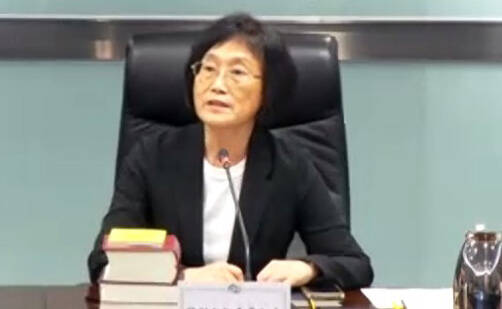The Financial Supervisory Commission (FSC) yesterday rejected CTBC Financial Holding Co’s (中信金控) bid to acquire Shin Kong Financial Holding Co (新光金控) through a public tender offer and share swap, saying the proposal lacked details and certainty that it would guarantee the interests of shareholders and the financial market’s stability.
The commission made clear its dislike for hostile takeover moves using share swaps because such arrangements would pose volatility to the firms’ share prices.
“CTBC Financial failed to put forth a sound plan to minimize predictable uncertainties,” FSC Deputy Chairwoman Jean Chiu (邱淑貞) told a news conference yesterday evening.

Photo: Wu Hsin-tian, Taipei Times
CTBC Financial last month proposed buying 51 percent of Shin Kong Financial shares on the open market and via a share swap scheme, a day after Taishin Financial Holding Co (台新金控) and Shin Kong Financial made a joint announcement about a merger through full share swap arrangements.
CTBC Financial also failed to address how it would fund the public tender offer or how it would handle Shin Kong Financial shares if the buyout falls through, Chiu said.
In addition, CTBC Financial failed to commit to capital increases for Shin Kong Financial’s life insurance arm, she said.
Financial conglomerates have a large market capitalization and should approach mergers and acquisitions with professional judgment and in a respectful manner, Chiu said, adding that CTBC Financial demonstrated a lack of understanding about Shin Kong Life Insurance Co’s (新光人壽) financial health. Cash-strained Shin Kong Life is the flagship unit of Shin Kong Financial.
Of the 195 mergers and acquisitions since 2002, only six attempts carried through using share swaps, Chiu said.
The commission has never approved the use of share swaps to purchase banks or life insurance companies because such schemes create volatility in mutual share prices and the financial market, she said.
The case is different for merger attempts because they should have won approval from bilateral board directors and attained the go-ahead from respective shareholders, she said.
CTBC Financial unveiled its buyout plan after board directors at Taishin Financial and Shin Kong Financial reached a merger agreement and discussed the matter for a long time, the commission said.
The commission said it is disappointed about the ongoing verbal attacks between CTBC Financial and Taishin Financial.
However, the commission said it does not favor merger bids over hostile takeover attempts, rather it assigns great importance to cash when reviewing hostile takeover bids.
In the past, tender bid initiators largely set their buyout target at 80 percent to diminish management right disputes and ensure smooth operations, Chiu said.
Taishin Financial and Shin Kong Financial next have to remove resistance from their shareholders before they put their case to regulatory review, the commission said.

NEW IDENTITY: Known for its software, India has expanded into hardware, with its semiconductor industry growing from US$38bn in 2023 to US$45bn to US$50bn India on Saturday inaugurated its first semiconductor assembly and test facility, a milestone in the government’s push to reduce dependence on foreign chipmakers and stake a claim in a sector dominated by China. Indian Prime Minister Narendra Modi opened US firm Micron Technology Inc’s semiconductor assembly, test and packaging unit in his home state of Gujarat, hailing the “dawn of a new era” for India’s technology ambitions. “When young Indians look back in the future, they will see this decade as the turning point in our tech future,” Modi told the event, which was broadcast on his YouTube channel. The plant would convert

‘SEISMIC SHIFT’: The researcher forecast there would be about 1.1 billion mobile shipments this year, down from 1.26 billion the prior year and erasing years of gains The global smartphone market is expected to contract 12.9 percent this year due to the unprecedented memorychip shortage, marking “a crisis like no other,” researcher International Data Corp (IDC) said. The new forecast, a dramatic revision down from earlier estimates, gives the latest accounting of the ongoing memory crunch that is affecting every corner of the electronics industry. The demand for advanced memory to power artificial intelligence (AI) tasks has drained global supply until well into next year and jeopardizes the business model of many smartphone makers. IDC forecast about 1.1 billion mobile shipments this year, down from 1.26 billion the prior

People stand in a Pokemon store in Tokyo on Thursday. One of the world highest-grossing franchises is celebrated its 30th anniversary yesterday.

Zimbabwe’s ban on raw lithium exports is forcing Chinese miners to rethink their strategy, speeding up plans to process the metal locally instead of shipping it to China’s vast rechargeable battery industry. The country is Africa’s largest lithium producer and has one of the world’s largest reserves, according to the US Geological Survey (USGS). Zimbabwe already banned the export of lithium ore in 2022 and last year announced it would halt exports of lithium concentrates from January next year. However, on Wednesday it imposed the ban with immediate effect, leaving unclear what the lithium mining sector would do in the